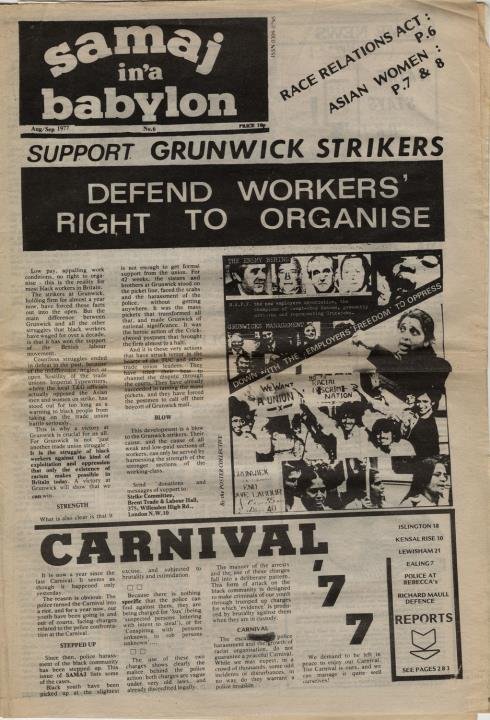
Samaj in’a Babylon
‐
National newspaper which focused on the experiences of racialized minority immigrants in Britain as well as related global news
Location(s)
Birmingham, London, Nottingham.
About
In 1976 the educator and activist Dina Abbott founded the newspaper Samaj in’a Babylon, a publication which allowed her and like-minded activists to write about anti-racism, anti-imperialism and workers’ rights in local, national and international contexts. The newspaper was run by a group consisting of people from the Caribbean and South Asia. Whilst few copies of the newspaper have been preserved, the available issues demonstrate a commitment to serving diasporic communities, with Urdu news articles as well as the use of anglicized Urdu. The title of the newspaper merged Rastafarianism and reggae culture with South Asian languages, an explicit act of solidarity which was foundational to the publication's ethos.
The articles themselves covered a range of topics, including a front-cover story in support of the Grunwick strikers, news for diasporic communities such as Guyana marking ten years of independence, critiques of right-wing fascist politicians, the trial of the Handsworth 28 and the effects of the Race Relations Act 1976, among other pieces. The newspaper celebrated the achievements of South Asian and Caribbean people in Britain, whilst also exposing institutional racism, patriarchal control, police brutality and the effects of imperialism.
Abbott and her collaborators would often travel between Nottingham and Birmingham to develop the paper. In addition, the group encouraged Abbott to deliver speeches on their behalf at conferences and rallies. This included speaking in support of the Bradford 12. In an interview given in 2019 as part of a series on the women’s movement in Nottingham, Abbott suggested that the police feared the group responsible for Samaj in’a Babylon and other anti-racist groups. During a 1979 conference at the Nottingham International Community Centre, Abbott remembered how the police were covertly in attendance. The chair of the talk, Abbott said, refused to begin until the police were removed, to ensure activists felt able to express their thoughts and experiences.
The paper was in existence for eighteen months. Its production is an important part of Nottingham’s history of radical anti-racist activism.
Dawson, Ashley, Mongrel Nation: Diasporic Culture and the Making of Postcolonial Britain (Ann Arbor: Michigan University Press, 2007)
Ramdin, Ron, The Making of the Black Working Class in Britain (London: Verso, 2017)
Sivanandan, Ambalavaner, ‘From Resistance to Rebellion: Asian and Afro-Caribbean Struggles in Britain’, Race & Class 23.2/3 (1981/2), pp. 111–52
Waters, Rob, Thinking Black: Britain, 1964–1985 (Berkeley: University of California Press, 2018)
MS 1591, Paul Mackney Collection, Birmingham City Archives, Birmingham
NEW/106, Samaj in’a Babylon, no. 6 (Aug/Sep 1977), George Padmore Institute, London
MSS.250/5/2/6, Papers of Richard Kuper, Samaj in’a Babylon, nos. 2–3 (Oct 1976–Jan 1977), Modern Records Centre, Warwick
FME/4/6, Interview with Dina Abbott, Feminist Archive East Midlands, University of Nottingham Special Collections, Nottingham
FME/3/5, Samaj in’a Babylon, no. 2 (Oct/Nov 1976), Feminist Archive East Midlands, University of Nottingham Special Collections, Nottingham
FME/3/5, Samaj in’a Babylon, no. 6 (Aug/Sept 1977), Feminist Archive East Midlands, University of Nottingham Special Collections, Nottingham

MS 1591, Samaj in'a Babylon, No. 6 (Aug/Sep 1977). Reproduced by permission of Paul Mackney.
Image credit
© Remaking Britain: South Asian Connections and Networks, 1930s – present
